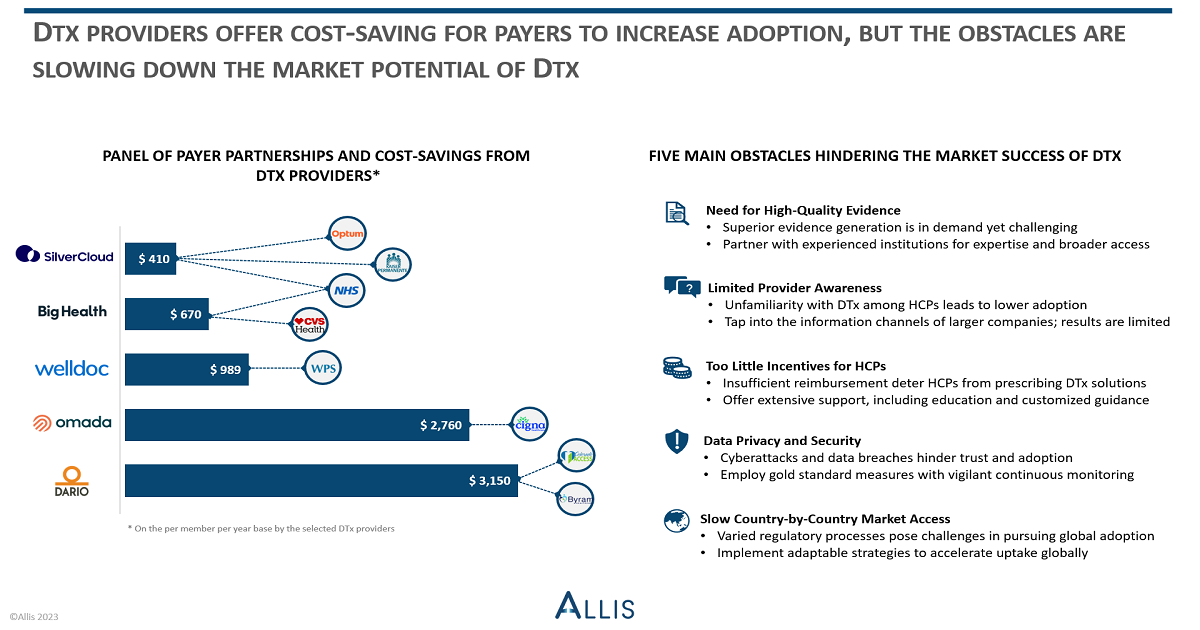

Article
The 5 Main Obstacles that Slow Down Market Success of DTx Solutions
Apr 04,2023
DTx solutions have raised significant awareness and funding over the last few years. Still, business and population health impact are limited. To unlock the full potential of DTx solutions, 5 main obstacles must be overcome.

Recently, the DTx term has experienced significant hype as Digital Therapeutics (DTx) have emerged as a promising subcategory of digital health solutions. These software applications offer therapeutic interventions backed by clinical evidence and safety, garnering growing interest from various players in the healthcare ecosystem.
Being companion a pill, improving a treatment procedure, reducing healthcare costs, and more is what DTx solution providers promise, leading to excitement among investors, payers, pharma, and other stakeholders who have closed deals with DTx solutions in large numbers.
In mental health, DTx solution provider SilverCloud already works with the NHS and has also partnered with Kaiser Permanente and Optum, claiming to save members up to $410 per completed treatment. Big Health has received multiple investments from Kaiser Permanente and has partnered with the NHS and pharmacy benefit managers such as CVS Health, claiming to offer cost savings of up to $670 per user per year.
DTx solutions are also being widely used in managing chronic illnesses such as diabetes, heart disease, and other cardiometabolic conditions. Welldoc partnered with WPS Health Insurance in 2021 for Type 2 Diabetes management DTx solution BlueStar, offering an average cost savings of $3150 per user per year. Omada Health partnered with Cigna Healthcare to launch the Diabetes Prevention Program, claiming health outcomes and average cost savings of $989 per member. Dario Health provides chronic disease management and behavioral change solutions to Medicare and Medicaid populations through partnerships with health plans such as Colorado Access and Byram Healthcare, offering cost savings of up to $2760 per member per year.
Persistent market barriers continue to impede the widespread adoption of DTx solutions, preventing them from becoming the new norm.
- Need for high-quality evidence: Generating evidence for DTx solutions is challenging and not all providers can meet the required rigor. According to the Clinicaltrials.gov database, out of the 800 published clinical trials involving a digital therapy intervention, only 300 have been completed to date. To increase clinical evidence quality, DTx providers should pursue collaborations with research centers, universities, and hospitals who can provide experience and access to larger patient populations.
- Limited provider awareness: The limited familiarity with DTx solutions among HCPs has led to lower adoption rates. To address this issue, DTx companies started to partner with established healthcare companies to enhance awareness and adoption among HCPs, but results are still limited.
- Too little incentives for HCPs: The limited financial incentives and the substantial time investment needed to assess DTx solutions contribute to a lack of motivation among HCPs to prescribe these options. There is also a pressing need to provide more comprehensive support for HCPs, including educational resources and tailored guidance. Addressing these existing challenges will not only bolster the understanding of DTx but also encourage HCPs to prescribe these solutions.
- Data privacy and security is still a killer argument: While DTx solutions generally adhere to regulations like GDPR in Europe and HIPAA in the US, compliance does not always guarantee the prevention of data breaches, and such incidents erode patient and HCP trust and adoption. Thus, DTx providers must be more vigilant about security measures, implementing continuous monitoring and aiming for cybersecurity gold standards to overcome growing concerns.
- Slow country-by-country market access: Unlike general health and wellness apps, which can be displayed globally with fewer regulatory consequences, DTx solutions must adhere to region/country-specific regulations. Consequently, DTx providers need to develop a thorough understanding of each region's or country's requirements and create adaptable strategies for development and approval processes to accommodate these diverse regulatory environments.
While DTx solutions promises to revolutionize healthcare, their widespread adoption hinges on overcoming several critical barriers. Success will be contingent upon demonstrating high-quality clinical evidence, addressing HCP incentives and their awareness of DTx, implementing rigorous data security measures, and navigating complex regulatory hurdles globally.


